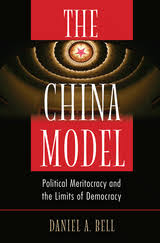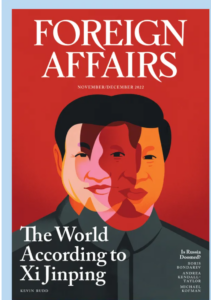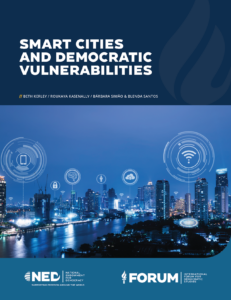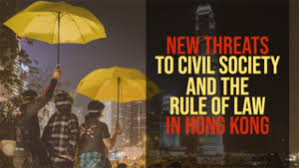China is at a tricky crossroads where its social contract is undergoing a paradigm shift. Its populace is among the world’s most digitally connected, but is also one of the oldest continuous living civilizations. The zero-Covid protests are a case in point, notes analyst Lub Bun Chong.
The young protesters may only number in the thousands, but their campaign for freedom of movement, right to justice and rights of expression, should not be taken lightly. The youth are an important stakeholder, and this is not lost on the Chinese leadership, he writes for The South China Morning Post.
Protests are by no means rare in China, but the recent upsurge was qualitatively different, said Cambridge University’s William Hurst (above). While previous discontent focused on local or specific grievances, these protesters shared a “seldom seen umbrella frame or master narrative” that criticized the ruling Communist Party.
 China’s recent protests and subsequent policy U-turn have discredited the Chinese “model” of supposed authoritarian competence, says Brookings’ analyst Shadi Hamid.
China’s recent protests and subsequent policy U-turn have discredited the Chinese “model” of supposed authoritarian competence, says Brookings’ analyst Shadi Hamid.
The authoritarian bargain in China has long been clear: Citizens forsake their freedom in return for economic gains, but because dictatorships, by definition, do not enjoy democratic legitimacy, their legitimacy relies almost entirely on performance—what political scientists call “output legitimacy,” he writes in The Atlantic.
The problem with this sort of legitimacy is that it can easily be undone by unusual circumstances and external shocks. China’s strict measures may have succeeded in containing COVID early on, but its draconian policies ever since have tested the limits of the populace’s patience. The once-formidable Chinese economy has ground to a halt, crippling businesses and sending youth unemployment to record highs. As a frustrated protester in the city of Chongqing put it: “There is only one disease in the world, that is, being unfree and poor, and now we have both.”
The problem with autocrats is that even if they make “good” decisions for a particular stretch of time, their good judgment never seems to last, Hamid adds. Because any mere mortal is prone to error, bias, and delusion, it is only a matter of time before a single leader—without an electorate to counter his or her excesses—begins making unwise, even destructive, choices.
 Some protesters called for political freedoms and demanded the party and Xi to step down – an unimaginable act of political defiance toward the country’s most powerful and authoritarian leader in decades, CNN adds. Unsurprisingly, a senior Chinese diplomat has accused foreign forces of “seizing the opportunity for politicization” and fanning a “color revolution.”
Some protesters called for political freedoms and demanded the party and Xi to step down – an unimaginable act of political defiance toward the country’s most powerful and authoritarian leader in decades, CNN adds. Unsurprisingly, a senior Chinese diplomat has accused foreign forces of “seizing the opportunity for politicization” and fanning a “color revolution.”
“At first, people took to the streets to express their dissatisfaction with how local governments were unable to completely and accurately implement measures introduced by the central government, but the protests were quickly exploited by foreign forces,” Lu Yashi, China’s ambassador to France, told journalists last week.
As a result of China’s “normfare” – the strategic promotion of the CCP’s favored interpretations of international norms – PRC-backed norms are being internalized by at least some African academics, politicians, and legal systems, according to a new analysis.
Chinese normfare may contribute to the construction of an alternative, authoritarian international law and the furtherance of an illiberal, China-dominated global order. To avoid these outcomes, actors—above all, the United States—should push back to blunt the effects of the PRC’s normfare and build a more resilient liberal human rights regime, including by implementing counter-normfare, Tanner Larkin writes for the Columbia Law Review.
Specifically, in terms of discourse, the United States should rebut the PRC’s charge that mainstream human rights doctrine merely reflects Western values by encouraging liberal democracies elsewhere in East Asia or the Global South, such as Japan, South Korea, and Botswana, to take more of a leadership role in international human rights settings, he suggests. RTWT
 “Firm democratic guardrails” would ensure that authoritarian actors such as China are not able to exploit emerging “smart city projects,” according to a new report from the National Endowment for Democracy’s International Forum.
“Firm democratic guardrails” would ensure that authoritarian actors such as China are not able to exploit emerging “smart city projects,” according to a new report from the National Endowment for Democracy’s International Forum.
Smart city initiatives can range from free public Wi-Fi to facial recognition cameras and sensors that monitor traffic flows, often leveraging technologies like artificial intelligence (AI) and the Internet of Things (IoT) to boost connectivity, streamline service provision, and make governance more accessible and efficient, the report states. But without firm democratic guardrails, they can also undermine privacy, erode good governance norms, and amplify the influence of authoritarian forces.
In the introductory essay, Beth Kerley, a program officer at the International Forum, surveys these risks and considers how participatory models of digitalization can offer an alternative to authoritarian ambitions of predictive governance and mass surveillance. RTWT

National Endowment for Democracy
China is subjecting Jimmy Lai, the founder of the pro-democracy Hong Kong newspaper Apple Daily, to a ‘travesty of justice’ because the Communist party regards his power as a threat, The Guardian’s Verna Yu reports:
“China is using him as an example to threaten others … for the highest deterrent effect,” says Sang Pu, a Hong Kong lawyer and political commentator now based in Taiwan. The legal process in Lai’s case – from his prosecution, prolonged detention, designation of national security judges and denial of a foreign lawyer – was part of a “sham trial” being manipulated by China, Sang says.
“Lai was the number one personality in Hong Kong’s civil society … the authorities want to ensure he is completely ruined,” he says.







